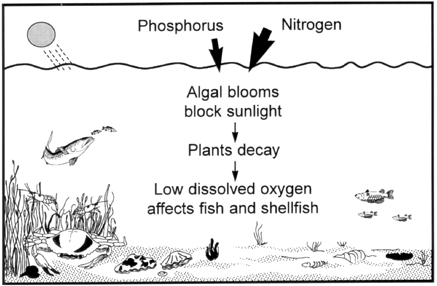The Chesapeake Bay is an ecosystem, composed of living parts: animals, plants and
microorganisms. Those parts are depends on each other. Take away or change some of this
parts, and the whole system feels the effects.
|
For many years the Chesapeake oyster was the number one resource. With the demand for
oysters its population in the Bay fell. The oysters are filter feeders. An oyster pumps
about 50 gallons of water a day in order to filter out algae, the tiny floating plants
that serve as its primary food source. As oysters feed, they act like filters in a
swimming pool, drawing out algae and clearing the water. Because oyster populations
now on such low level, it would now take a year or more for today’s oysters to filter
that same amount of water.
|
 |
|
The Bay now has too much algae floating through the water. It is mean the lack of
light for underwater grasses. Those grasses in many places may provide food for diving
ducks or shelter for molting crabs. Many grasses now have disappeared, leaving large
stretches of Bay bottom bare.
|
 |
To make it shorter:
 People harvested oysters and destroyed the oyster reefs.
People harvested oysters and destroyed the oyster reefs.
 Peoples activity Increased amount of algae in the water by adding more nutrients.
Those nutrients come from sewage treatment plants, from fertilized farm fields.
These nutrients cause even larger blooms of algae, which die and decompose on the Bay
floor, a process that draws life-sustaining oxygen out of the water.
Peoples activity Increased amount of algae in the water by adding more nutrients.
Those nutrients come from sewage treatment plants, from fertilized farm fields.
These nutrients cause even larger blooms of algae, which die and decompose on the Bay
floor, a process that draws life-sustaining oxygen out of the water.
|
|
 People torn away the forests, cleared the land for agriculture. This increased
the amount of the dirt washed to the Bay during the storms and heavy rains. Soil
erosion continues today also because of construction and other land development in
the watershed. Every construction site has the potential to release tons of sediment
into the Bay.
People torn away the forests, cleared the land for agriculture. This increased
the amount of the dirt washed to the Bay during the storms and heavy rains. Soil
erosion continues today also because of construction and other land development in
the watershed. Every construction site has the potential to release tons of sediment
into the Bay.
 People added new chemical compounds to the Bay. Heavy metals like zinc and mercury
from industrial uses, pesticides from farms and suburban lawns, cleaning solutions from
households, and a host of petroleum products all wash off the land into the streams and
the rivers that feed the Bay.
People added new chemical compounds to the Bay. Heavy metals like zinc and mercury
from industrial uses, pesticides from farms and suburban lawns, cleaning solutions from
households, and a host of petroleum products all wash off the land into the streams and
the rivers that feed the Bay.
|
Human beings rely on this Bay as much as any animal; and we also bear a special
responsibility, since our actions have an impact on the ecosystem greater than that
of any other creature that walks the Earth.
|

